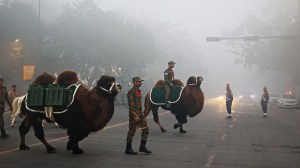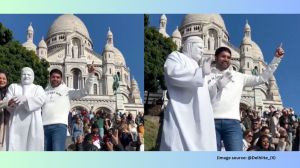What If8230;
There is never a mention of 9/11, but the 8220;relentless unforeseen8221; hovers over Philip Roth8217;s re-imagination of history, set 60...

There is never a mention of 9/11, but the 8220;relentless unforeseen8221; hovers over Philip Roth8217;s re-imagination of history, set 60-odd years ago, a what-if phantasmagoria with calamitous possibilities. Told through the eyes of a seven-year-old 8212; Roth himself 8212; this is one book of fiction which doesn8217;t seem all that implausible, especially in a terror-struck world when fighting imaginary, at least sometimes, enemies appears to be the norm.
Roth gives history a turn it had not taken 8212; he imagines that in 1940, instead of Roose-velt winning a third term, Charles Lindbergh, a right-wing isolationist, the pioneer aviat-or openly in awe of Hitler, is voted president. True, as president, Lindbergh does little else apart from signing a non-aggression pact with Hitler, allows a Nazi embassy in Washington and together with wife Anne Morrow hosts a state dinner for von Ribbentrop, Hitler8217;s foreign minister. But the nightmare 8212; of Kafkaesque proportions 8212;is in what he may be capable of doing. There is a wave of growing anti-Semitism 8212; maybe nowhere near Hitler8217;s pogroms 8212; but terrifying nevertheless. With Jewish families mysteriously thrown out of hotel rooms or evicted from familiar neighbourhoods with disastrous effect.
That a master is at work becomes evident when he chooses to tell the reconstructed history through the eyes of his own family. As native New Jerseyans, the senior Roths, Herman and Bess, and their two sons, Sandy and Phil, never had to come under pressure because they were Jewish. But what if they had? How would they behave? How would a seven-year-old react when Lindbergh8217;s election assaulted, 8220;as nothing ever had before, that huge endowment of personal security that I had taken for granted as an American child of American parents in an American school in an American city in an America at peace with the world.8221;
In reality, Europe was in the grip of World War II from 1939-1943, with America too drawn into it. In Roth8217;s hands, the war-at-large is kept off, albeit for a while, as a little boy and his family and friends fight the battle at home. With only a gossip columnist Walter Winchell leading the political opposition against Lindbergh.
While father Herman struggles with the America he knew falling apart 8212; 8220;it can8217;t happen here? My friends, it is happening here8221; is a paranoid cry you hear often; mother Bess8217;s job is to hold their world together. Brother Sandy creates more turbulence when he goes for an internship with a tobacco farmer in Kentucky under a scheme called 8220;Just Folks8221;, which is a way of absorbing Jews with other Americans. To Phil, his father is a hero 8220;ruthlessly obedient to their idea of fair play8221;; while many others, including his uncle and aunt, are 8220;remorseless about making money8221; or too busy aligning themselves with Lindbergh whose only apparent goal is to keep America out of all foreign wars and to keep all foreign wars out of America.
The Roths will escape the tragic turn of events but Phil8217;s lonely friend next door, Seldon Wishnow, isn8217;t so lucky, facing the brunt of anti-Semitism, the closest to the German Jewish experience. And it8217;s because Phil wants to get rid of him that Seldon, displaced from New Jersey, loses everything, becoming a stump: 8220;the blunt remnant of something whole that belonged there and once had been there.8221;
And in case you mix up fact and fiction, Roth provides an elaborate postscript with the true chronology of the ears 1940-42. But he needn8217;t have because 8220;the terror of the unforeseen is what the science of history hides, turning a disaster into an epic8221;. Roth has just turned it around like only he can, holding up the making of the disaster8230; soon to pass into history as inevitable.
While The Plot8230; may pale in comparison to his masterpieces American Pastoral, I Married a Communist or The Human Stain 8212; there is no ruthless reinvention of the self or a rediscovery of America as it were 8212; many of the dialogues, particularly the emotional outbursts, are vintage Roth. We can also trace some of the paranoia to one of his famous Zuckerman books, The Ghost Writer, where Z runs into Anne Frank8230; the narrator realising that growing up Jewish in New Jersey in the 1940s was very different from growing up Jewish in fascist Europe. But what if it were not so? As always, Roth marvels in the re-telling. Sheer pleasure.
- 01
- 02
- 03
- 04
- 05































